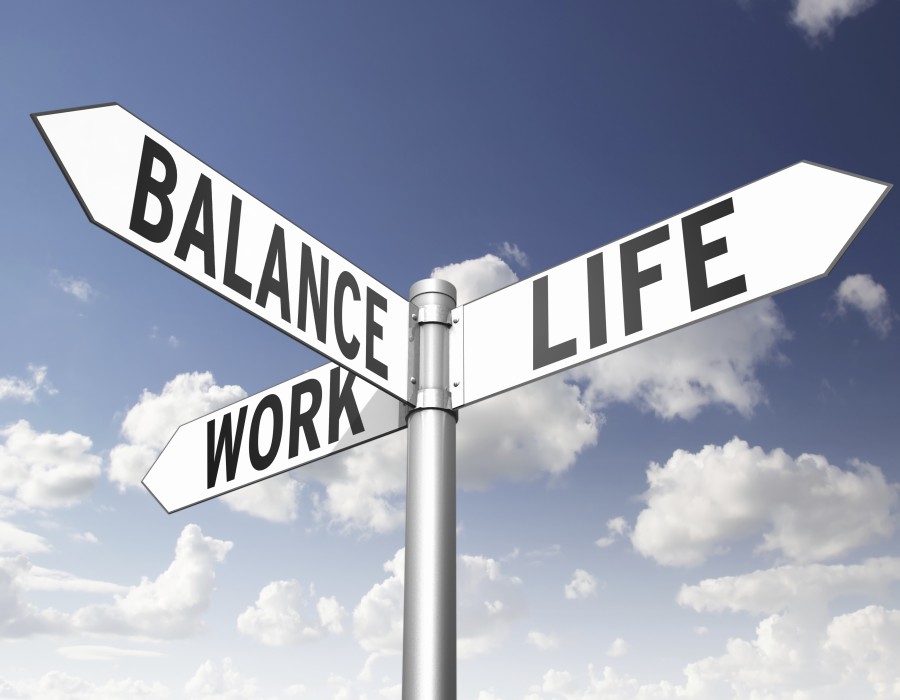This article is part of a series on work-life balance. Check out the companion pieces here: The 20 Best Work-Life Balance Jobs and 5 Signs You Might Be a Workaholic.
By Deborah Jian Lee
These days, work-life balance can seem like an impossible feat. Technology makes workers accessible around the clock. Fears of job loss incentivize longer hours. In fact, a whopping 94% of working professionals reported working more than 50 hours per week and nearly half said they worked more than 65 hours per week in a Harvard Business School survey. Experts agree: the compounding stress from the never-ending workday is damaging. It can hurt relationships, health and overall happiness.
Work-life balance means something different to every individual, but here health and career experts share tips to help you find the balance that’s right for you.
1. Let go of perfectionism
A lot of overachievers develop perfectionist tendencies at a young age when demands on their time are limited to school, hobbies and maybe an after-school job. It’s easier to maintain that perfectionist habit as a kid, but as you grow up, life gets more complicated. As you climb the ladder at work and as your family grows, your responsibilities mushroom. Perfectionism becomes out of reach, and if that habit is left unchecked, it can become destructive, says executive coach Marilyn Puder-York, PhD, who wrote The Office Survival Guide.
The key to avoid burning out is to let go of perfectionism, says Puder-York. “As life gets more expanded it’s very hard, both neurologically and psychologically, to keep that habit of perfection going,” she says, adding that the healthier option is to strive not for perfection, but for excellence.
2. Unplug
From telecommuting to programs that make work easier, technology has helped our lives in many ways. But it has also created expectations of constant accessibility. The work day never seems to end. “There are times when you should just shut your phone off and enjoy the moment,” says Robert Brooks, a professor of psychology at Harvard Medical School and co-author of The Power of Resilience: Achieving Balance, Confidence and Personal Strength in Your Life. Brooks says that phone notifications interrupt your off time and inject an undercurrent of stress in your system. So don’t text at your kid’s soccer game and don’t send work emails while you’re hanging out with family, Brooks advises. Make quality time true quality time. By not reacting to the updates from work, you will developing a stronger habit of resilience. “Resilient people feel a greater sense of control over their lives,” says Brooks, while reactive people have less control and are more prone to stress.
3. Exercise and meditate
Even when we’re busy, we make time for the crucial things in life. We eat. We go to the bathroom. We sleep. And yet one of our most crucial needs - exercise - is often the first thing to go when our calendars fill up. Exercise is an effective stress reducer. It pumps feel-good endorphins through your body. It helps lift your mood and can even serve a one-two punch by also putting you in a meditative state, according to the Mayo Clinic.
Puder-York recommends dedicating a few chunks of time each week to self-care, whether it’s exercise, yoga or meditation. And if you’re really pressed for time, start small with deep breathing exercises during your commute, a quick five minute meditation session morning and night, or replacing drinking alcohol with a healthier form of stress reduction.
“When I talk about balance, not everything has to be the completion and achievement of a task, it also has to include self-care so that your body, mind and soul are being refreshed,” says Puder-York.
These exercises require minor effort but offer major payoffs. Psychotherapist Bryan Robinson, who is also professor emeritus at the University of North Carolina at Charlotte and author of the book Chained to the Desk, explains that our autonomic nervous system includes two branches: the sympathetic nervous system (our body’s stress response) and the parasympathetic nervous system (our body’s rest and digest response). “The key is to find something that you can build into your life that will activate your parasympathetic nervous system,” says Robinson. Short, meditative exercises like deep breathing or grounding your senses in your present surroundings, are great places to start. The more you do these, the more you activate your parasympathetic nervous system, which “calms everything down, (and) not just in the moment,” says Robinson. “Over time you start to notice that in your life, your parasympathetic nervous system will start to trump your sympathetic nervous system.”
https://www.forbes.com/sites/deborahlee/2014/10/20/6-tips-for-better-work-life-balance/#7e8b91029ff5
- Abuse & The Abuser
- Achievement
- Activity, Fitness & Sport
- Aging & Maturity
- Altruism & Kindness
- Atrocities, Racism & Inequality
- Challenges & Pitfalls
- Choices & Decisions
- Communication Skills
- Crime & Punishment
- Dangerous Situations
- Dealing with Addictions
- Debatable Issues & Moral Questions
- Determination & Achievement
- Diet & Nutrition
- Employment & Career
- Ethical dilemmas
- Experience & Adventure
- Faith, Something to Believe in
- Fears & Phobias
- Friends & Acquaintances
- Habits. Good & Bad
- Honour & Respect
- Human Nature
- Image & Uniqueness
- Immediate Family Relations
- Influence & Negotiation
- Interdependence & Independence
- Life's Big Questions
- Love, Dating & Marriage
- Manners & Etiquette
- Money & Finances
- Moods & Emotions
- Other Beneficial Approaches
- Other Relationships
- Overall health
- Passions & Strengths
- Peace & Forgiveness
- Personal Change
- Personal Development
- Politics & Governance
- Positive & Negative Attitudes
- Rights & Freedom
- Self Harm & Self Sabotage
- Sexual Preferences
- Sexual Relations
- Sins
- Thanks & Gratitude
- The Legacy We Leave
- The Search for Happiness
- Time. Past, present & Future
- Today's World, Projecting Tomorrow
- Truth & Character
- Unattractive Qualities
- Wisdom & Knowledge





Comments